Free tuition for 12 years - higher than the interest rate on real estate, gold, and bonds - makes parents willing to lend international schools 3-5 billion VND.
In recent days, many parents have struggled to get back the money they lent to the American International School Vietnam (AISVN) but have been unsuccessful. In 2018, AISVN implemented a loan contract for parents with an amount of 2-5 billion VND. These are interest-free loans, in return for their children being able to study for free until grade 12 or transferring schools. The contract stipulates that when the students complete the procedures, the school will return the borrowed money after 90 days. If payment is delayed, AISVN will have to pay additional interest according to the mobilization interest rate of Vietcombank Headquarters. The maximum delay is 90 days.
The transaction is a way for many private schools to raise capital. Instead of accessing money from banks, the board of directors chooses to borrow from parents. They do not pay interest in cash but in tuition at the school they run.
According to information published on the AISVN homepage, the tuition fee for 12 years is about 6.95 billion VND. This is considered the interest when parents lend. Assuming a parent lends a maximum of 5 billion, the efficiency of the above investment is 139% for 12 years, an average of 11.58% per year.
Thus, this deal is more effective than investing in USD, gold, real estate and bonds in the period of 2011-2021, based on statistics from Dragon Capital. The interest rate of 11.58% when lending capital to AISVN is only behind stock investment (15.8%). Not to mention, if the board of directors effectively uses capital to build, upgrade and develop schools, parents will also benefit when their children have access to an increasingly high-qualityeducational environment.
Because there is no collateral, this is a credit loan, which means it is based on the borrower's reputation. Banks usually verify income and credit history before granting credit, but parents cannot do that. According to some parents, they often rely on seeing better facilities than regular schools, a team of teachers and administrators with many foreigners, or trust in the reputation of the educational environment.
Not only AISVN, many private schools also implement this activity under the name of "educational investment package" such as Dewey school system, South American International School (UTS), ICS school system, North American International School (SNA)... According to MSc. Bui Khanh Nguyen - an independent education expert specializing in international school research, the form of borrowing capital from parents to establish and develop has existed for nearly 15 years and has become popular in recent years. According to his statistics, there are currently about 20 international and bilingual schools in Ho Chi Minh City and Hanoi with "educational investment" packages through the form of paying tuition fees many years in advance.
Although there are schools invested by large corporations such as Nord Anglia, Cognita, Inspired Education, etc., Mr. Nguyen said that most international schools are currently established by small and medium-sized domestic companies. To build a private international or bilingual school in general, it takes from 500 billion to several thousand billion VND for building facilities, renting land, operating costs, mainly to pay salaries for the management team and foreign teachers. Therefore, many school construction projects need loans.
"There are very few non-profit private schools that operate for the purpose of serving education and society. Most operate for profit with the ultimate goal of making money from education," the expert said.
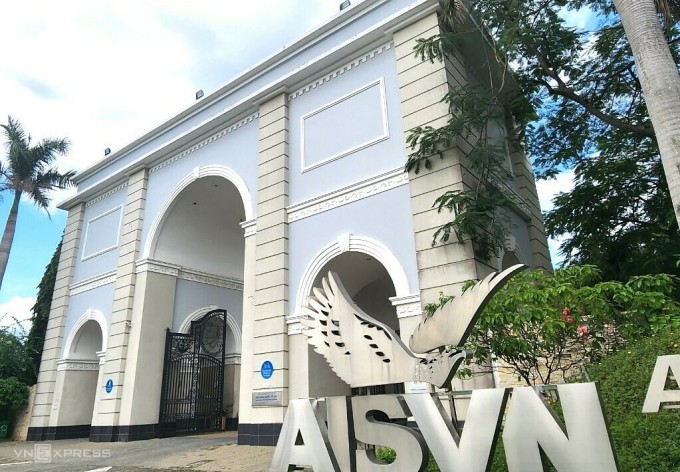
The campus of the American International School Vietnam in Nha Be. Photo: Le Nguyen
"Education investment" packages have exploded during the period of low interest rates and cheap money . Since the beginning of 2018, lending interest rates for normal businesses at state-owned commercial banks for medium and long term have been 9.3-10.3% per year and 10-11% per year at joint stock commercial banks.
When a business needs capital, it often turns to banks. But according to Mr. Nguyen, borrowing from banks often requires collateral, which many school projects do not have because many schools start out "bare-handed". Borrowing from banks also carries the risk of fluctuating and unpredictable interest rates. Banks often increase interest rates by over 10% a year, and this is also the driving force behind school projects wanting to borrow capital directly from parents.
Suppose a private school needs to borrow 500 billion VND from the bank in early 2018, they can bear an average interest rate of 10.5% per year for 10 years. In the first year, the school has to pay the principal and interest of more than 8 billion VND per month, decreasing over time. Regardless of whether the enrollment is good or not, whether it is affected by macro fluctuations such as epidemics, economic crises or not, they still have to spend billions of VND in financial costs every month. The total interest to be paid after 10 years will be nearly 265 billion VND.
In addition, private education enterprises often follow a roadmap, the first 5 years are the period of focusing all efforts on expansion - the most "capital-hungry" period. According to VnExpress 's source at a large education corporation in the South, attracting capital from parents from the beginning will bring great financial potential to schools, much more than collecting tuition fees by semester. Usually after about 10 years, schools will enter the profit-making stage, so they are confident that they can easily pay back the capital to parents.
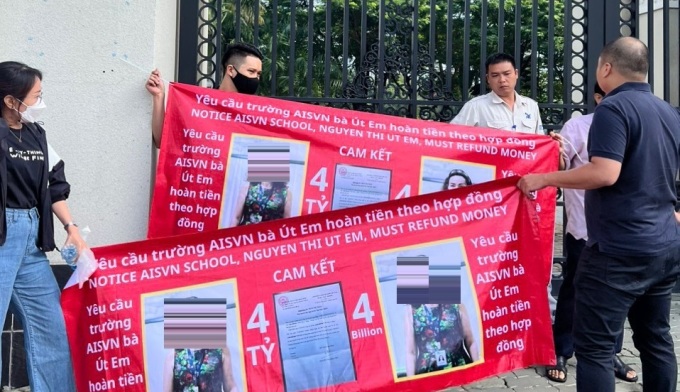
Parents of the American International School Vietnam came to the school gate to collect debt on September 21. Photo: Provided by parents
A staff member at an educational business unit in the South said that when implementing this model, businesses actually researched and analyzed parents' insights very carefully before implementing it. A private school under this group also implemented a similar "education investment" package because they believed that most parents were high-income earners and business people. They considered their children's education as an investment. Although they did not earn direct interest, lending to schools helped them "profit" by ensuring their children continued to study at international schools.
"As business people, they understand risks very well," this person affirmed. The commitment for their children to study continuously for 12 years at an international school gives them peace of mind. If there are future events such as economic crisis, business bankruptcy or tuition inflation, their children's education will not be affected.
However, Master Bui Khanh Nguyen stated that the form of education investment through tuition fees essentially implies a credit relationship, in which the school "cuts the bridge" with the bank by working with parents. Because the history of private schools in Vietnam is still young, especially international schools, international schools run by domestic companies are still very amateurish. If the board of directors invests money in non-educational investments with the hope of making quick profits, the risk of losing money and bankruptcy is very high when the school is not a professional investment fund. According to his observation, the top 3 best international schools in Ho Chi Minh City do not have this form of capital mobilization.
"Because it is an unsecured loan with no collateral, parents take on a high level of risk," said this expert.
Siddhartha
Source link


![[Photo] General Secretary To Lam visits exhibition of achievements in private economic development](https://vphoto.vietnam.vn/thumb/1200x675/vietnam/resource/IMAGE/2025/5/18/1809dc545f214a86911fe2d2d0fde2e8)


![[Photo] National conference to disseminate and implement Resolution No. 66-NQ/TW and Resolution No. 68-NQ/TW of the Politburo](https://vphoto.vietnam.vn/thumb/1200x675/vietnam/resource/IMAGE/2025/5/18/adf666b9303a4213998b395b05234b6a)

![[Photo] More than 17,000 candidates participate in the 2025 SPT Competency Assessment Test of Hanoi National University of Education](https://vphoto.vietnam.vn/thumb/1200x675/vietnam/resource/IMAGE/2025/5/17/e538d9a1636c407cbb211b314e6303fd)




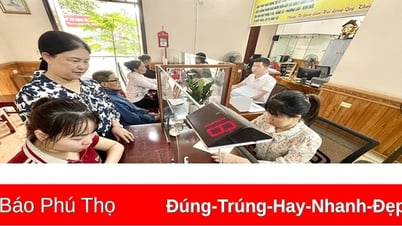




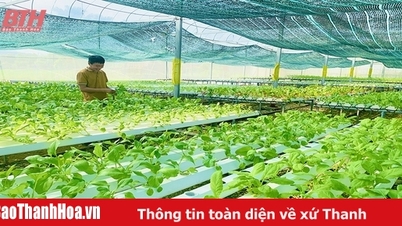






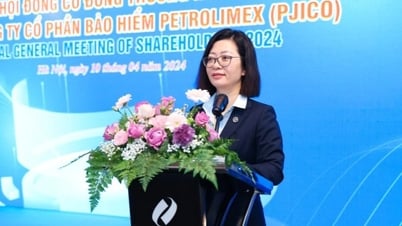


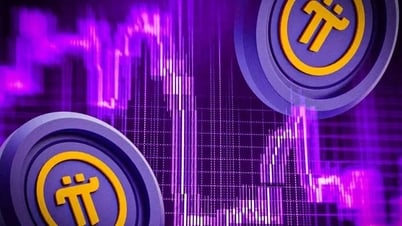










![[Photo] Prime Minister Pham Minh Chinh chairs meeting on science and technology development](https://vphoto.vietnam.vn/thumb/1200x675/vietnam/resource/IMAGE/2025/5/17/ae80dd74c384439789b12013c738a045)










































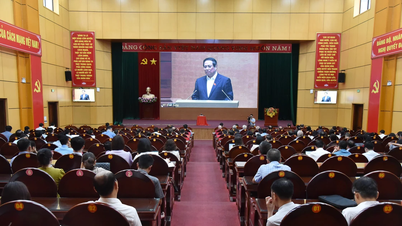

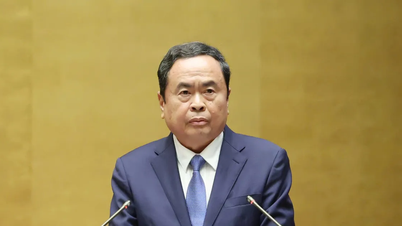


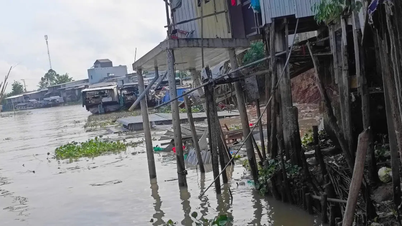
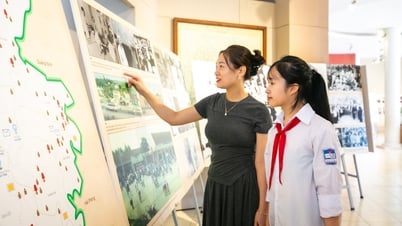










Comment (0)